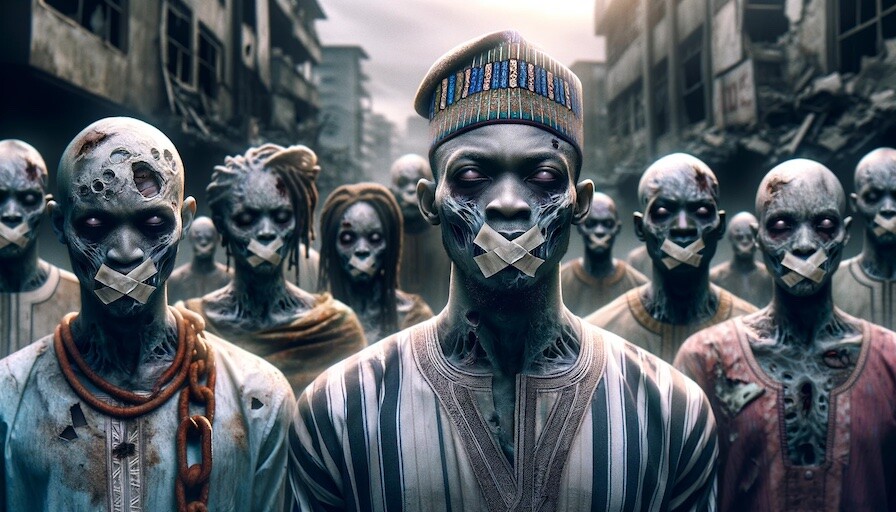By Nnaoke Ufere, PhD
Many Nigerians suffer from a metaphorical disease known as the Nigerian Mind Virus. This condition transforms individuals into passive followers, devoid of critical thought, agency, or resistance, akin to zombies under the control of those in power.
In this state of mind, the afflicted take no action against the man-made problems plaguing the nation and those responsible. This apathy results in a cycle of incompetence, unaccountability, impunity and stagnation.
The Nigerian mind virus has dulled the once-vibrant spirit of activism and resistance that characterized the Aba Women’s Riot of 1929 or the #EndSARS protest of 2020, leading to widespread disillusionment and a lack of initiative.
Instead of challenging President Tinubu’s ineffective leadership, harmful policies, and corruption, and demanding transparency, many have become resigned to the status quo, feeling powerless to effect change.
This collective inertia has hampered progress and allowed the Tinubu administration and the National Assembly to implement harmful policies and perpetuate their self-serving agendas without fear of reprisal.
As a result, our country’s development has stagnated, and societal issues such as poverty, starvation, inequality, and poor governance remain unaddressed.
We watch in muted voices as our most vulnerable—the poor, children, and the elderly—suffer and die around us. Yet, we remain silent, incapacitated by this pervasive sense of helplessness.
To eradicate this virus, we must revitalize the spirit of activism and accountability and rekindle the optimism and determination that once defined our nation.
This involves inspiring everyone to take up the mantle of positive change and peacefully challenge the oppressors who have driven our nation into the abyss. It necessitates cultivating a culture of critical thinking and supporting grassroots movements that challenge existing power structures.
Only by fostering collective action and resilience can we reignite the vibrant spirit of resistance that won our independence in 1960 and drive meaningful progress for our country. Only then can the nation break free from the grip of the mind virus and move towards a more united, stable, just and prosperous future.
Symptoms
Those infected exhibit pervasive docility, hopelessness, chronic despair, and a resigned acceptance of the country’s worsening conditions and their devastating effects on livelihoods. They hold a pessimistic outlook, convinced that Nigeria is destined to collapse, and have given up hope. Sadly, over 70% of our fellow citizens fall into this category, according to a survey by Afrobarometer.
In this ailing mindset, those infected believe Nigeria’s problems are insurmountable and efforts to rectify them are futile. They vent and complain on social media without offering solutions, reinforcing a cycle of negativity and helplessness. To them, Nigeria has no redeeming value, and no effort is worth expending to halt the decline.
As the virus spreads, Nigerians will remain manipulated by politicians and religious charlatans, trapped in economic desperation, ignorance, and fear. Many more people will die of starvation or killed by kidnappers or armed gangs.
Ultimately, the nation’s progress and stability will be severely compromised, leaving the majority of our citizens in a state of perpetual suffering and hopelessness.
Today’s dire conditions create a fertile ground for the Nigerian Mind Virus to grow and spread. This virus flourishes in an environment characterized by bribery, tribalism, religious prejudice, economic desperation, social division, and widespread misinformation.
Consequently, many individuals resign themselves to their fate, overlooking Tinubu’s policy failures, poor economic planning, and the resulting mass starvation and suffering. Hyperinflation, severe unemployment, rampant insecurity, and pervasive corruption are wreaking havoc on their lives. Tragically, most of the nation’s problems are man-made, with President Tinubu at the helm as the chief architect of these issues.
Meanwhile, members of the National Assembly and the judiciary prioritize their personal interests, granting themselves excessive and unearned compensation while the working poor beg for a meager N60,000 monthly wage. They blatantly disregard the suffering of the people who elected them.
Yet, Nigerians find themselves unable to take action against this blatant injustice and inequality—a consequence of the debilitating effects of the Nigerian mind virus.
In this virus-ravaged mindset, these Nigerians have adopted a stance of seeing, hearing, speaking no evil, and taking no actions against their oppressors, enabling a culture of impunity, incompetence, unaccountability, and malfeasance to worsen and thrive unchecked, further entrenching the power of those who oppress them.
These fellow citizens have collectively surrendered their rights and obligations to self-preservation and self-determination in the face of relentless leadership ineptitude and the resulting mass suffering. They have become the silent majority.
Worse, those afflicted by the virus don’t vote. In the last election, they found countless reasons to stay home and vent online. This explains the low 26.7% turnout rate in the 2023 presidential election, the lowest since the return to democracy in 1999 (ICIR Nigeria, 2023). If they had voted, Tinubu wouldn’t be president today, regardless of INEC’s alleged rigging.
Identifying individuals afflicted by the Nigerian Mind Virus involves recognizing certain behaviors:
- Accepting and supporting government injustices without question.
- Naively believing political promises that conditions will improve after enduring hardships.
- Viewing current challenges as unchangeable acts of God’s divine will.
- Accepting religious leaders’ assurances that things will improve in God’s time.
- Relying solely on divine intervention rather than taking civic action.
- Feeling powerless and believing they cannot effect change.
- Attributing problems to vague concepts like “bad leadership” instead of holding specific individuals accountable.
- Blaming other tribes or perceived enemies for national issues.
- Accepting bribes to buy their silence or inaction, instead of demanding permanent change from politicians.
- Displaying a defeatist mentality, marked by hopelessness and resignation to fate.
- Complaining and venting on social media without participating in real-life events to demand change.
There is no known vaccine for this affliction. What concerns me the most is its virality and zombification effects. The symptoms worsen daily, and we must find a remedy if we are to reverse our nation’s decline.
How We Got Infected
Once upon a time, Nigerians were less susceptible to the mind virus. We were a nation of optimists, human rights agitators, go-getters. We held our leaders accountable and had a vibrant culture of activism.
Influential figures like Funmilayo Ransome-Kuti, Fela Anikulapo-Kuti, Ken Saro-Wiwa, Gani Fawehinmi, Chimamanda Ngozi Adichie, Chinua Achebe, Wole Soyinka, Emmanuel Onwubiko, Aisha Yesufu, and Kiki Mordi exemplified this spirit.
These individuals, among others, championed social justice, fought against oppression, and inspired generations with their resilience and courage.
Moreover, courageous organizations have shown their capacity for collective action through events like the Aba Women’s Riot in 1929 and the #EndSARS protests in 2020. The Aba Women’s Riot accelerated Nigeria’s path to independence, while the #EndSARS movement marked a significant stand against police brutality, corruption, and bad governance.
However, I posit five factors to explain how we got here: money, religion, tribalism, ignorance, and Stockholm syndrome.
Money suppresses the societal immune system, allowing politicians to exploit the weakened system through bribery and manipulation to silence the economically desperate, including religious leaders. This transactional approach undermines democracy and perpetuates corruption.
Tribalism incubate the Nigerian Mind Virus, as politicians use ethnic divisions to foster hate and deepen societal divides, distracting from governance issues and leveraging ethnic allegiances to maintain power and silence dissent.
Religion provides fertile ground for the mind virus to fester. Corrupt pastors and imams deceive their followers into believing their suffering is the will of God, not the result of incompetent leadership, leading to unquestioning support for specific leaders.
Ignorance acts as a catalyst for the virus. Poor education and misinformation ensure many Nigerians remain unaware of their rights and unable to critically evaluate their leaders’ actions.
Fear weakens resistance against the mind virus. Incidents like the Lekki Toll Gate shooting instill fear, discouraging resistance and compelling acceptance of oppressive circumstances.
Stockholm syndrome accelerates the contagion effect, leading to irrational loyalty and admiration for abusers. This misplaced loyalty strengthens corrupt leaders and hinders collective action against injustice.
Udofia Akpabio – Example of an Infected Nigerian
To cite one example among many, the story of Udofia Akpabio embodies its devastating impact. Udofia, a bright graduate from Covenant University, is trapped in despair and mental paralysis. Despite his degree, he remains jobless four years after graduation, living with his parents in a cramped Abuja home at the time of our interview.
Politicians flaunt their wealth while Udofia’s dreams fade, their election promises now distant and unattainable.
Frustration grows as Udofia sees a government indifferent to his plight. His anger simmers, yet fear of action paralyzes him. Though he vents and rants on social media, the thought of joining a peaceful protest fills him with dread, so he stays home.
This fear grips Udofia, making him unable to act against injustices and the blunders of corrupt politicians. As a result, he has become like a zombie, controlled by those who oppress him.
Udofia, like millions of his fellow citizens, has turned to prayers and despair. He prays three or four times a day but is unsure if God hears him. His pastor preaches endurance, but he wonders how much more he can endure when he can’t even afford to eat some days. Yet, he still obliges.
Unfortunately, his situation continues to worsen daily as the Tinubu administration seems lost and clueless about how to address the myriad problems facing the nation.
The high costs of basic necessities like food, rent, and medicines have skyrocketed out of reach for Udofia and millions of others due to Tinubu’s policy blunders and a National Assembly more interested in enriching its members than improving the welfare of the citizens who elected them.
Disturbingly, Udofia is not alone. The Nigerian Mind Virus has gone viral, infecting millions and turning the nation into a zombie state where hope is scarce, and people are paralyzed by a sense of helplessness and despair.
According to a survey by Afrobarometer, 7 out of 10 Nigerians indicated they would not participate in protests against injustices, despite 8 out of 10 acknowledging the country’s dire state and widespread suffering.
Udofia’s life, and those of millions of Nigerians, is a painful routine of hopelessness and passivity, their potential stifled by a system designed to keep them down.
Despite his desire for change, the Nigerian Mind Virus keeps him and his fellow citizens immobilized, silent witnesses to their own suffering and the nation’s decay.
How to combat The Nigerian Mind Virus
To combat the Nigerian Mind Virus, it’s crucial to educate yourself and others about your rights and the true state of affairs in Nigeria. Seek reliable information and promote civic education within your community to encourage critical thinking and active citizenship. Engage in peaceful protests to demand accountability from leaders, leveraging both social media and offline actions to amplify your voice, as seen during the #EndSARS protests.
Reclaim your agency by collectively standing up against the administration’s bad policies that’s killing hundreds of thousands of impoverished citizens and demanding accountability from leaders.
Reject tribalism and religious manipulation by focusing on common national interests and fostering inter-tribal and interfaith dialogues for unity. Support anti-corruption initiatives by actively participating and reporting corruption, advocating for transparency at all governance levels.
Overcome fear and complacency by standing together in solidarity, challenging unjust policies, and promoting mental health and resilience within your community to build mutual support networks against oppression.
However, the on-again, off-again trade unions strikes by the NLC and TUC are utterly pathetic and ineffective. They have become a predictable pattern, and the government knows these strikes are not a deterrent, but merely a temporary inconvenience. In response, the administration employs a drip-drip strategy to weaken and derail any attempt to extract meaningful concessions.
What is required is a commitment to sustained, nationwide peaceful protests and labor strikes involving both the private and public sectors, culminating in a million-person march in Abuja. Only through relentless, coordinated action can we compel the government to negotiate in the best interests of all Nigerians rather than the private interests of politicians and their cronies.
By uniting against harmful government policies, pervasive injustices, inequality, and insecurity, and by voting out Tinubu and his cohorts in 2027, we can restore hope, reverse the nation’s decline, and rebuild a society where self-preservation and self-determination are realities. This united effort is essential to breaking free from the paralyzing grip of the Nigerian Mind Virus.
In conclusion, the Nigerian Mind Virus can only be eradicated through the proactive and collective actions of individual citizens. By educating ourselves, engaging in peaceful protests and civil disobedience, rejecting divisive tactics, supporting anti-corruption efforts, and overcoming fear, we can reclaim our autonomy and actively participate in nation-building.
The future of our country and the well-being of future generations depend on our willingness to rise above passivity and demand a better, more just society. We must be prepared to make sacrifices to achieve meaningful change.




